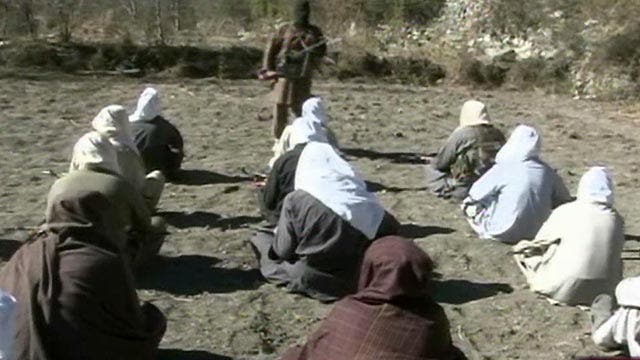Defiant message to America from Afghanistan's president
Jennifer Griffin reports from Washington
The Afghan government has released 65 detainees from a former American prison despite protests from the U.S. military over concerns the "dangerous" fighters will return to the battlefield to kill coalition and Afghan forces.
Maj. Nimatullah Khaki, a spokesman for the Parwan Detention Facility at Bagram Air Base, said all 65 were freed on Thursday morning. He said they were laughing and smiling as they boarded a bus to leave the facility.
President Hamid Karzai ordered their release several weeks ago from prison facility, drawing angry denunciations from the U.S. and straining relations between the two countries ahead of the year-end withdrawal of most international combat troops.
The U.S. military strongly condemned Thursday's release, saying some of those set free were directly linked to attacks that have killed or wounded 32 U.S. or coalition personnel and 23 Afghan security personnel or civilians.
"The release of these dangerous individuals poses a threat to U.S., Coalition and Afghan National Security Forces, as well as the Afghan population. Insurgents in the group released today have killed Coalition and Afghan Forces," the U.S. Forces Afghanistan said in a statement.
"They have killed Afghan men, women and children. More than two dozen of the individuals released were linked to the production or emplacement of improvised explosive devices, the number one killer of Afghan civilians."
Afghan Defense Ministry spokesman Mohammad Zair Azimi confirmed the release Thursday but would not comment on U.S concerns.
"Our responsibility is the protection of the prisoners. That is all," Azimi told The Associated Press.
A statement from the U.S. Embassy in Kabul on Thursday called the release "deeply regrettable" and called on Karzai's government to ensure those released do not commit new acts of violence.
"We requested a thorough review of each case. Instead, the evidence against them was never seriously considered," the embassy statement said, adding, "The Afghan government bears responsibility for the results of its decision."
Among the 65 detainees believed to have walked free Thursday morning are:
-- Mohammad Wali, apprehended in Helmand province in May 2013. He is a suspected Taliban explosives expert who reportedly was behind IEDs targeting ANSF and coalition forces. He was biometrically linked to two IED incidents, plus a latent fingerprint match linked him to another IED in Helmand province. Wali's personal property tested positive for multiple types of explosives in an explosive-residue test after his capture.
-- Nek Mohammad, captured in Kandahar province in May 2013. He is accused of facilitating rocket attacks against Afghan and coalition forces. He was apprehended with several 107mm artillery shells, mortar rounds and improvised explosive components, including at least 25 pounds of homemade explosives.
-- Mohammadullah, apprehended in Paktiya province in May 2013. He is believed to be a Haqqani network IED specialist who builds and sets IED's. Mohammadullah was biometrically linked to an IED and tested positive for four types of explosives in an explosive-residue test. He was captured with his Haqqani commander, Ehsanullah, who is also being released.
-- Ehsanullah, captured in Paktiya province in May 2013. He is a suspected Haqqani network commander who plans IED operations and attacks against ANSF and coalition forces. He was biometrically linked to a radio-controlled IED and tested positive for two types of explosives in an explosive-residue test.
At a Senate Armed Services Committee hearing on Tuesday, Sen. Lindsey Graham, R-S.C., warned Karzai that continuing with plans to release these suspected terrorists, captured by U.S. forces and handed over to the Afghans for trial, would further damage the relationship with the U.S.
Graham said he planned to introduce a resolution condemning the release and would urge his Senate colleagues to cut all developmental aid until after the upcoming Afghan presidential election, which is slated for April when Karzai is constitutionally required to step down.
According to the Defense Department, 17 of the prisoners Karzai released are directly linked to the production and placement of roadside bombs. Twenty-three of them tested positive for explosive residue when they were captured, according the Pentagon.
But Afghan officials say that they have not been able to find enough evidence to build a case against any of the 88 prisoners. Critics of the move say Karzai is doing this right now to help with his negotiations with the Taliban and that he is preparing for when U.S. forces leave the region. Karzai, likely for the same reason, also continues to refuse to sign a bilateral security agreement that the U.S. says it needs in order for any U.S. troops to remain in Afghanistan after the end of this year.
"We've undercut him all along," said Richard Grenell, a former spokesman for several U.S. ambassadors to the United Nations. "First of all, this administration has terrible relations with Karzai. We tried to put a Taliban office in Qatar, and then had to pull it back. He [Karzai] took that as a signal that we were undercutting him, and his power."
Fox News' Jennifer Griffin and The Associated Press contributed to this report.





